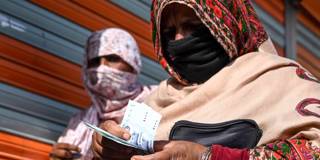Before COVID-19 arrived, social scientists had already established that cash transfers and mobile money are two of the most effective tools for assisting the poor and vulnerable in difficult conditions. Now is the time for governments to act on those findings, and to build up additional data for the future.
BOSTON/CHICAGO – While high-income countries have been able to spend trillions of dollars to buttress their economies as they weather the COVID-19 crisis, many other countries do not have anywhere close to the same resources at their disposal. In the countries where the world’s poorest people live – including major middle-income economies such as India, Nigeria, and Bangladesh – the pandemic calculus is critically different.
Policymakers outside of the rich world are facing a new version of the old “trolley problem.” In that thought experiment, a subject is faced with the choice of redirecting a speeding streetcar from a track where it would kill several people onto one where it would kill just one. The choice is obvious from a strictly utilitarian perspective, but actually pulling the lever to condemn someone to certain death is not so easy.
In the case of the pandemic, the number of lives at stake means that policymakers must make decisions quickly. They are confronted with a series of apparent dilemmas: viral containment vs. the economy; young vs. old; essential workers vs. those who can shelter in place. But the choices before them in the COVID-19 crisis are not nearly as straightforward as in the trolley problem, because one cannot always tell which track will save more lives. And attribution can be hard: the “uncontained pandemic” track may lead to a clear and observable number of deaths, whereas the “economy shattered” track would lead to a diffuse and difficult-to-ascertain number of deaths from myriad downstream effects. And, eventually, if and when a vaccine is developed and becomes widely available, there may be heated debates about whether the paths not taken should have been chosen after all.

BOSTON/CHICAGO – While high-income countries have been able to spend trillions of dollars to buttress their economies as they weather the COVID-19 crisis, many other countries do not have anywhere close to the same resources at their disposal. In the countries where the world’s poorest people live – including major middle-income economies such as India, Nigeria, and Bangladesh – the pandemic calculus is critically different.
Policymakers outside of the rich world are facing a new version of the old “trolley problem.” In that thought experiment, a subject is faced with the choice of redirecting a speeding streetcar from a track where it would kill several people onto one where it would kill just one. The choice is obvious from a strictly utilitarian perspective, but actually pulling the lever to condemn someone to certain death is not so easy.
In the case of the pandemic, the number of lives at stake means that policymakers must make decisions quickly. They are confronted with a series of apparent dilemmas: viral containment vs. the economy; young vs. old; essential workers vs. those who can shelter in place. But the choices before them in the COVID-19 crisis are not nearly as straightforward as in the trolley problem, because one cannot always tell which track will save more lives. And attribution can be hard: the “uncontained pandemic” track may lead to a clear and observable number of deaths, whereas the “economy shattered” track would lead to a diffuse and difficult-to-ascertain number of deaths from myriad downstream effects. And, eventually, if and when a vaccine is developed and becomes widely available, there may be heated debates about whether the paths not taken should have been chosen after all.